In a tragic turn of events, three U.S. service members lost their lives, and dozens more were wounded in a recent drone attack on a U.S. base located in northeastern Jordan. The base, identified as Tower 22, stands as an outpost near the Syrian border, emphasizing the intricate web of geopolitical challenges the United States faces in the Middle East. This incident marks the first deadly strike against U.S. forces since the Israel-Hamas conflict erupted in October.
The Jordanian base, where the attack unfolded, has been a focal point of U.S. military activities and joint exercises with Jordanian forces. Jordan, a key ally in the region, has long-standing partnerships with the United States, contributing to the broader strategy for regional stability. However, the recent attack has cast a dark shadow on the collaborative efforts between the two nations.
As the U.S. Central Command confirmed the casualties and injuries, attention turned to the evolving situation in the Middle East and the complex network of actors involved. The attack has sparked concerns over the growing influence of Iran-backed groups in the region, with the White House explicitly blaming such entities for the strike. The Islamic Resistance in Iraq, an umbrella organization comprising hardline Iran-backed militant groups, claimed responsibility for the attack, targeting not only the Jordanian base but also two other bases in the region.
This incident serves as a grim reminder of the multifaceted challenges faced by the U.S. military in the Middle East. Despite the official stance that the United States is not at war in the region, the frequency of attacks by Iran-backed groups indicates a persistent threat. Over the past few months, U.S. forces have encountered more than 150 attacks from such groups in Iraq and Syria since the Israel-Hamas conflict erupted. These attacks underscore the complex nature of the conflicts in the Middle East and the intricate balance the U.S. military must navigate to protect its interests and personnel.
Jordan, with its strategic location and historical ties to the United States, finds itself in a delicate position. The country has been an active participant in joint military exercises, contributing to regional stability efforts. However, the recent attack on its soil has raised questions about the effectiveness of existing security measures and the need for further collaboration to counter emerging threats.
The fallout from this incident reverberates not only through the corridors of power in Washington but also across the broader international community. The U.S. President, Joe Biden, expressed condolences for the fallen soldiers and pledged a response to the attack. The tragedy serves as a somber backdrop to the ongoing diplomatic efforts in the region and adds a layer of urgency to addressing the root causes of instability.
As the United States grapples with the aftermath of this attack, the focus turns to understanding the motivations behind such strikes and identifying the perpetrators. The complexities of the Middle East, marked by historical tensions, regional rivalries, and the influence of non-state actors, create a challenging landscape for policymakers.
While the immediate response is to mourn the loss of American lives and seek justice for those responsible, a comprehensive strategy is required to address the broader issues fueling regional conflicts. This includes diplomatic initiatives, intelligence-sharing, and collaboration with regional allies to dismantle networks supporting terrorism.
Read More:
- Middle East attack kills 3 U.S. Military soldiers
- Republicans Challenge Ambiguous Gun Control Bill: A Closer Look at LD1696
- Biden: My Border Security Law Would Let Me ‘Shut Down The Border Right Now And Fix It Quickly’
In conclusion, the recent drone attack on U.S. service members in Jordan underscores the intricate challenges faced by the United States in the Middle East. The incident is a stark reminder of the multifaceted nature of conflicts in the region and the need for a nuanced approach to navigate the complex geopolitical landscape. As the United States mourns the loss of its soldiers, it also grapples with the broader implications of the attack on regional stability and the ongoing efforts to foster peace in the Middle East.

